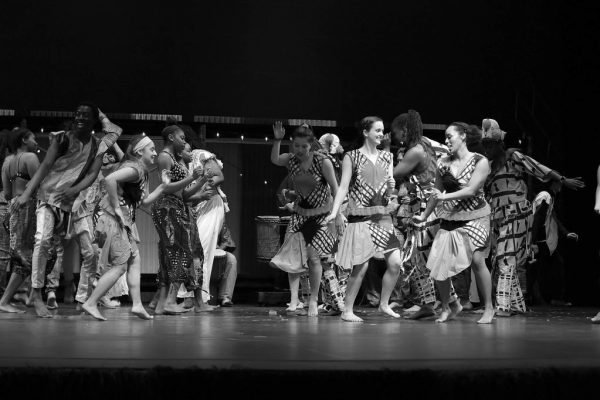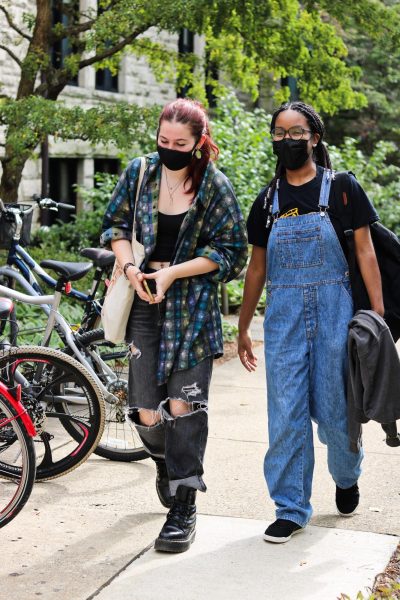Drive to Survive Fails to Address Systemic Inequities in Formula One
On March 11, Netflix released season 4 of the hit docuseries Formula 1: Drive to Survive. Drivers race in some of the most lavish cities on earth, countless celebrities attend races, and the entertainment surrounding the spectacle is second to none. There’s no doubt that watching drivers race at death-defying speeds for millions of dollars is compelling television.
However, one glaring aspect of the show bothers me. Formula One is historically dominated by white people, and nothing has been done to increase diversity in the sport. Yet, the show fails to discuss this issue in depth. F1 is a selfish institution that prioritizes profit over creating positive systemic change. In four seasons of the show, the only discussion on racism is a three-minute interview with Lewis Hamilton, the only Black driver in F1’s 72-year history, on the racism he experienced growing up. The show fails to go in depth about why racism is an issue in F1, what can be done to solve the issue, and how to create change going forward.
Hamilton is the only driver actively supporting anti-racist initiatives. A seven-time world champion and role model on and off the track throughout his career, Hamilton has received no visible support from his fellow drivers or the white businessmen who benefit from his success.
The title “Drive to Survive” is ironic because growing up, Hamilton was literally driving to survive. Hamilton is one of few F1 drivers who does not come from wealth. To fund his racing career, his father worked up to four jobs at a time, while most other drivers’ parents could effortlessly afford racing costs.
One of the barriers to a career in motorsport is the cost. On average, entry-level motor racing costs are almost $40,000 per year when competing at a national level F1. Black children are more likely to come from low-income families than white children, and therefore less likely to have the funds to break into the sport.
Unfortunately, access to the sport has only gotten worse since Hamilton broke into F1. According to Hamilton, the sport is a “billionaire boys club.”
“If I go back to where I started, growing up in a normal working-class family, there is no way I could be here — the guys you are fighting against have that much more money,” Hamilton told Spanish newspaper Diario AS.
In 2020, Hamilton started The Hamilton Commission, a holistic survey intent on finding out why there is little Black representation in motorsport. The commission found complex and interlinked reasons, which include motorsport industry practices, educational bias, and classroom culture.
Typically, F1 staff are recruited from a small pool of British universities instead of trained through pathways such as apprenticeships, which are more financially accessible and produce equally talented engineers.
Even when Black people have the financial means to break into the sport, racism is rampant, which further deters Black individuals from following in Hamilton’s footsteps.
Hamilton’s success on the track has fostered resentment among opposing racing teams. When they couldn’t beat him on the track, they resorted to using discriminatory language in a cowardly attempt to break Hamilton’s mental fortitude.
“I’ve had it so many times,” Hamilton said in an interview for the new season of Drive to Survive. “When people call you names and the N-word is thrown around, when you’re told to go back to your country when you’re in your own country, it hurts. There are literally millions and millions of people around the world who will have experienced much, much worse, and that needs to change.”
F1 is racist on an institutional level. The Hamilton Commission formulated action steps that F1 can take right now to increase diversity in motorsport. They called on those in leadership positions to support Black children to pursue careers in STEM and empower them to succeed in fulfilling careers in motorsport. They also called on them to step up, acknowledge the unfairness that exists, and commit to change. None of these calls to action have been met with a meaningful response from F1. So far, all they have done is let drivers take a knee before races, and that ended after the 2020 season.
The classism and racism of F1 is not just a sport-specific issue. The sport’s collective negligence is a microcosm of barriers to entry for people of color in all facets of life. By neglecting to address these issues, F1 is supporting racist practices. There is no excuse for these practices to continue. The sport has both the funds and recognition to increase diversity within the sport and make a massive worldwide impact in the fight against racism. If everyone in motorsport supports anti-racist initiatives, it could set a precedent for progress to be made worldwide. If not, then this whitewashed, elitist “billionaire boys club” will continue to promote inequality and systemic oppression.




